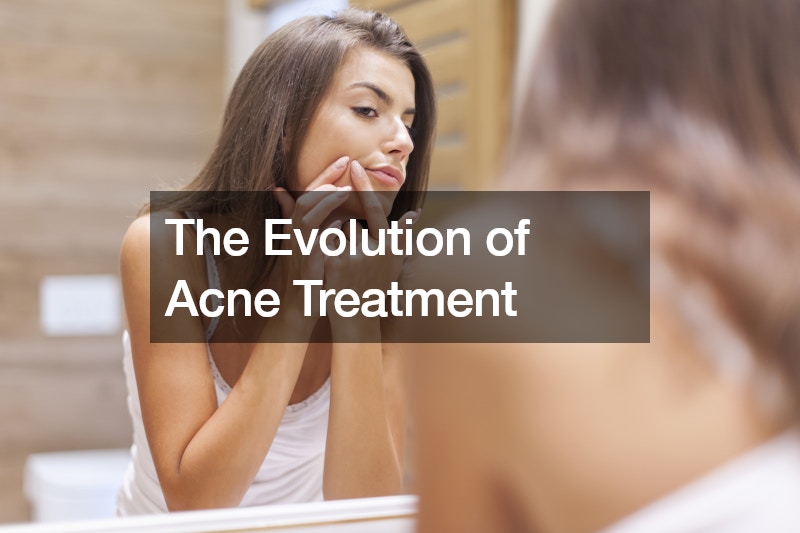Acne, a common skin condition characterized by blemishes, has been a persistent concern for individuals across generations. While its exact cause may vary, including genetic predisposition and environmental factors, the quest for effective acne treatment has been ongoing. Over time, the approach to managing acne has evolved significantly, reflecting advancements in medical understanding and skincare technology.
The Historical Context of Acne Treatment
For centuries, individuals have grappled with acne, seeking remedies to alleviate its physical and emotional toll.
Historical treatments often involved topical applications and home remedies, but their efficacy was limited. Greasy hair conditioners and thick moisturizers were identified as common culprits exacerbating acne, leading to what is known as “pomade acne.”
Advancements in Topical Treatments
One of the most significant advancements in acne treatment came with the introduction of topical medications. Ingredients like benzoyl peroxide and salicylic acid revolutionized acne management by targeting inflammation, bacteria, and pore blockages. These treatments offered a more targeted approach to preventing and treating blemishes, leading to improved outcomes for many individuals.
Oral Medications: A Pill for Severe Cases
In cases of severe or persistent acne, oral medications have become indispensable. Oral antibiotics, such as tetracycline and doxycycline, are effective in killing acne-causing bacteria and reducing inflammation from within. Isotretinoin, a potent medication derived from vitamin A, regulates oil production and prevents pore blockages, but its use requires careful monitoring due to potential side effects.
Hormonal Acne and Hormone Regulation
Hormonal fluctuations, particularly during adolescence, play a significant role in acne development. For individuals experiencing hormonal acne, birth control pills containing estrogen may be prescribed to regulate hormone levels and minimize acne flare-ups. This approach addresses the underlying hormonal imbalances contributing to acne breakouts.
Lifestyle Factors and Acne Triggers
Beyond skincare products and medications, lifestyle factors have emerged as significant contributors to acne development. Stress, poor diet, lack of exercise, and inadequate sleep have all been linked to acne flare-ups. Managing stress levels, adopting a balanced diet, engaging in regular physical activity, and prioritizing quality sleep are essential steps in minimizing acne breakouts and promoting overall skin health.
Personalized Treatment Approaches
As our understanding of acne has deepened, so too has our approach to treatment. Dermatologists now emphasize the importance of personalized treatment plans tailored to individual needs. By accurately diagnosing the type and severity of acne and considering factors such as skin type, lifestyle, and medical history, dermatologists can develop comprehensive treatment strategies that address each patient’s unique concerns.
The Role of Skincare Habits
While medical interventions play a crucial role in acne management, maintaining good skincare habits is equally important. Daily cleansing with a mild soap helps remove excess oil, dirt, and dead skin cells, preventing pore blockages. Additionally, using oil-free or non-comedogenic moisturizers and sunscreen protects the skin without exacerbating acne.
Looking Ahead: Advances in Acne Treatment
As research continues and technology advances, the landscape of acne treatment is poised for further evolution. From innovative topical formulations to personalized oral medications and holistic approaches, the future holds promise for more effective and tailored solutions for acne sufferers. By combining medical expertise with comprehensive skincare routines and lifestyle modifications, individuals can achieve clearer, healthier skin and enhanced overall well-being.
Exploring Alternative Therapies
In recent years, alternative therapies have gained attention as complementary approaches to conventional acne treatment. Techniques such as light therapy, including blue light and photodynamic therapy, have shown promise in targeting acne-causing bacteria and reducing inflammation. Additionally, natural remedies like tea tree oil, aloe vera, and green tea extract have demonstrated anti-inflammatory and antimicrobial properties, offering gentler options for individuals with sensitive skin.
The Impact of Genetics and Environmental Factors
While acne treatment has made significant strides, the interplay between genetics and environmental factors continues to influence its prevalence and severity. Individuals with a family history of acne may be genetically predisposed to the condition, highlighting the importance of personalized treatment approaches. Environmental factors such as pollution, humidity, and exposure to UV radiation can also exacerbate acne, underscoring the need for holistic skincare regimens that address these external influences.
Empowering Individuals Through Education
Beyond treatment modalities, education plays a crucial role in empowering individuals to manage their acne effectively. By understanding the underlying causes of acne, recognizing potential triggers, and adopting proactive skincare practices, individuals can take control of their skin health and achieve long-term results. Dermatologists play a vital role in educating patients about acne management strategies and guiding them toward evidence-based treatments that align with their goals and preferences.
In conclusion, the evolution of acne treatment reflects advancements in medical understanding and skincare technology. From traditional topical remedies to sophisticated oral medications and personalized treatment plans, the approach to managing acne has become more comprehensive and effective. By addressing both the underlying causes of acne and the external factors contributing to its development, individuals can achieve clearer, healthier skin and improved overall well-being.
.







